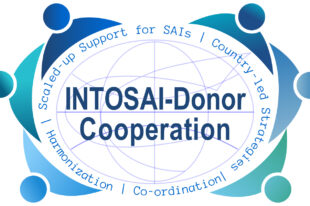The seven essential benefits from the exercise of SAIs with jurisdictional functions

By Denis Gettliffe, Project manager for the promotion of international activities of the French Cour des comptes
SAIs with jurisdictional powers are often misunderstood, and the value of their specific features is generally not fully appreciated. A SAI has jurisdictional powers when it has received the legal mandate to sanction a person on the grounds of an irregularity or damage, related to the use of public funds under the SAI’s jurisdiction and which can be imputed to that person, following contradictory-adversal proceedings.
The INTOSAI P-50 norm defines the 12 Principles of jurisdictional activities of SAIs (which is further detailed in the earlier article in this edition about the P-50 norm).
About 25% of all supreme audit institutions (SAIs) represented in INTOSAI undertake jurisdictional activities. The Forum of jurisdictional SAIs, created in Paris in 2015, is gathering these SAIs who want to explain and promote their jurisdictional mission.
At Lisbon, in 2021, the Forum drafted an advocacy presenting the seven essential benefits from the exercise of SAIs with jurisdictional functions.
This advocacy details the particular importance of this power of sanction or reparation, as well as the benefit that it represents when the SAI is endowed with it, for the political authorities and for the citizens of the country.
1. A judge who can extend and supplement the auditor’s findings and recommendations
A SAI’s audit functions are enriched by the jurisdictional powers recognized by law, and are exercised by the SAI to impose sanctions. Depending on the State, the purpose of the judge may be remedial and/or dissuasive (“punitive”), by ordering the perpetrators of irregularities or damages to reimburse all or part of the funds involved, such as compensatory damages but also consequential damages, or to pay a fine, or to undergo disciplinary or professional sanctions.
Thus, the jurisdictional function becomes the SAI’s armed tool. It allows the SAI to effectively extend, through sanctions and/or reparations, some of its critical observations on irregular or harmful acts that may have been found as a result of audits, without having to resort to the intervention of another authority, administrative or judicial.
The two functions of judgement and audit do not hinder each other but, on the contrary, complement each other. Where infringements identified as a result of audits or controls fall within the jurisdictional competence of the SAI, the timeframe for responding to the finding and sanctioning of such infringements can therefore be shortened. In this case, the means of investigation, analysis and decision making are concentrated in a single institution, which is more efficient and more economical.
2. An additional guarantee of rigorous management given to the citizen and the taxpayer
The power of control, accountability and decision-making in matters of responsibility attributed to a SAI strengthens the conviction among managers, citizens and the public authorities. This power ensures that the SAI’s action is effective and results in concrete consequences.
The jurisdictional function makes it possible to better respond to the increased demand for accountability expressed by citizens and thus contributes to the strengthening of the rule of law.
3. A tangible sign of the personal accountability of managers and the requirements associated with accountability
The SAI’s deep knowledge of the public bodies that are regularly subject to its audit and jurisdiction is an undeniable asset for identifying the most frequent irregular practices and sanctioning them itself or referring the public managers to the competent authorities, if they are of a criminal nature.
The jurisdictional SAI must therefore coordinate its action with the judicial authorities responsible for the repression of criminal offences. Coordination is easier when these respective organizations, with a jurisdictional character, are similar.
This coordination is an additional guarantee of the existence of a reliable and coherent system for combating breaches of probity, which also contributes to the prevention of fraud and the promotion of integrity.
4. A relevant alternative to the “all-penalty” system
Jurisdictional functions of the SAI allow for swift and appropriate prosecution, which do not fall under the jurisdiction of the criminal courts. The functions provide an effective and proportionate solution that guarantees the sanction and/or the reparation of the manager’s faulty or negligent behavior.
Thanks to its experience in both audit and judgement, the jurisdictional SAI has a deep knowledge of the political and administrative organization of a country, as well as of the complexity of the rules for the use of public funds. It is therefore able to build up a flexible jurisprudence adapted to the offences that public managers may commit.
5. A strengthened independence that benefits all the missions carried out by the SAI
The jurisdictional function of a SAI, by virtue of the jurisdictional (or related) status it implies and the guarantees it requires, allows the SAI to enjoy greater independence, and is necessary for the accomplishment of this function.
This independence necessarily reflects on the exercise of the SAI’s non-jurisdictional tasks.
The political authorities can therefore rely on the SAI’s findings and judgements to convince citizens of the effectiveness of the public financial and management control system.
6. The original culture of proof and verification, at the birth of the “adversarial” principle
The traceability of the evidence supporting the jurisdictional decision and the practice of adversarial debate with the litigant are additional guarantees for public managers of the SAI’s professionalism and impartiality.
This culture of evidence also contributes to reinforce the relevance and objectivity of the SAI’s audit observations and recommendations. Adversarial debate also ensures that the evidence put forward is indisputable, and exposed to the objections of the other parties, and that all the arguments of each party have been heard, thus enhancing the credibility of the SAI.
In this way, not only in jurisdictional matters but also in all the SAI’s functions, the political authorities have a quality assurance of the SAI’s work, based on the culture of evidence that has emerged from its jurisdictional activity.
7. Particularly demanding procedural rules and professional and ethical standards, guaranteeing integrated quality control
When it has jurisdictional functions, the auditing SAI offers the audited party the same guarantees of rigor and probity as a judge in relation to any litigant. The basis of the rules of jurisdictional procedure are set by the legislator and not by the SAI itself, which constitutes an additional guarantee for the political authorities.
The jurisdictional function, by the nature of its procedural requirements, serves both as a model and a training system for all the other missions of the SAI.
Proving the interest of such benefits, some states have recently decided to give their SAIs jurisdictional powers, which were previously lacking (which you can read about in this special edition the contributions of SAIs of Latvia, South Africa and Thailand). Others are considering joining the Forum (in this edition’s contribution of the Indonesian SAI).
In line with the United Nations’ Sustainable Development Goal 16 of the 2030 Agenda, these seven benefits indeed represent considerable assets for an institutional donor and for the political authorities of a country that would like to strengthen the good governance of public finances and management, as well as the principles of accountability, transparency, equality, justice and efficiency in the use of public funds, including those loaned or donated by international partners. Additionally, the effective and professional exercise of an SAI’s jurisdictional functions enhances citizens’ confidence in the management of public funds by its leaders and thus their credibility and legitimacy of the latter as well as to strengthen citizens’ trust in public institutions.
The value of advocacy also lies in facilitating SAIs’ communication with the media, citizens and public opinion.
This advocacy is therefore intended to convince political authorities and international donors it is in the common interest to protect and strengthen the jurisdictional competence of SAIs, or to endow them with such power. The effective exercise, in accordance with professional standards, of a SAI’s jurisdictional powers improves the governance of states, strengthens citizens’ confidence in the management of public funds and, as a result, enhances the credibility and legitimacy of leaders.
Spread the news!





